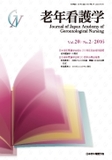Japanese
English
- 販売していません
- Abstract 文献概要
- 参考文献 Reference
抄録
本研究は,介護老人保健施設入所者を対象に睡眠の実態調査を行い,生活習慣要因が夜間睡眠に与える影響を明らかにすることを目的にした.車いすを使用している入所者を対象に,アクティウォッチ®を用い中途覚醒時間,睡眠効率,総睡眠時間を測定し,日中の生活習慣要因および夜の生活習慣要因と比較した.
分析対象者は25人で平均年齢は83.5±8.7歳であった.日中の離床頻度が2回以上の者は総睡眠時間が410.6分(中央値)であり,1回の者より長く(p=.034),就寝前床上時間が1時間以上は睡眠効率が66.5%(中央値)であり,1時間未満の者より低く(p=.038)有意差が認められた.また,好みのレクリエーションがある者は,睡眠効率が80.4%(中央値)であり,ない者より高く(p=.043)有意差が認められた.
これらの結果から,個々の高齢者に合わせた就床時間や生活習慣,好みを生活に取り入れることが,睡眠,覚醒リズムを整えることにつながり,入所者の夜間睡眠を改善させることにつながると示唆された.
The purpose of this study was to clarify the impact of lifestyle factors on nighttime sleep by conducting a survey on the state of sleep among long-term care facility residents. Targeting residents who use wheelchairs, we measured nocturnal waking duration, sleep efficiency, and total sleep duration using Actiwatch® and compared the daytime to the nighttime lifestyle factors.
The subjects of analysis were 25 persons with an average age of 83.5 ± 8.7. The total sleep duration of those who got out of bed twice or more during the daytime was 410.6 minutes (median), which was longer than that of those who got out of bed once (p = .034). The sleep efficiency of those who spent one hour or more in bed before sleeping was 66.5% (median), which was less than that of those who spent less than one hour (p = .038), showing a significant difference. Moreover, the sleep efficiency of those who had a preferred recreation was 80.4% (median), which was higher than that of those with no preference (p = .043), thus showing a significant difference. These results suggest that, by choosing the time in bed and lifestyle habits that suit each elderly person and by incorporating their preferences in lifestyle, the sleep and wake rhythm can be adjusted, which will lead to an improvement of the nighttime sleep of residents.
Copyright © 2016, Japan Academy of Gerontological Nursing All rights reserved.


